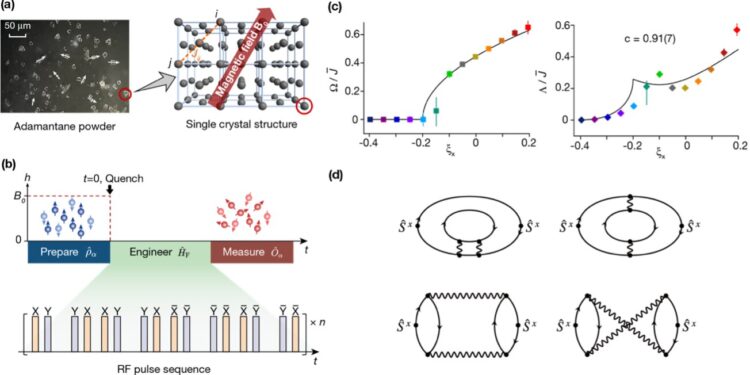A. Adamantane Powder Sample (C10H16) and its lattice structure. b. Experimental protocol and pulse sequence. c. Universality observed in the dynamics of spin depolarization. d. Dominant interaction processes behind spin depolarization dynamics. Credit: Professor Du’s team
A new study has discovered universal dynamics far from equilibrium in randomly interacting spin models, complementing the well-established universality of low-energy equilibrium physics. The study, recently published in Natural physicsis the result of a collaborative effort involving the research group led by Professor Du Jiangfeng and Professor Peng Xinhua from the University of Science and Technology of China (USTC), as well as the theoretical groups of Professor Zhai Hui from the Tsinghua University and Dr. Zhang Pengfei of Fudan University.
Non-equilibrium dynamics in many-body quantum systems is at the core of the current development of modern quantum science and technology, where rich phenomena have been discovered in recent years, especially in synthetic quantum platforms such as ultracold atoms, superconducting qubits, trapped ions. , NV centers and NMR systems.
However, despite the richness of its phenomena, simple and universal rules behind non-equilibrium quantum dynamics are still missing. Non-equilibrium dynamics typically involve highly excited states beyond the conventional universality of low energies.
Whether universal behavior can also emerge in non-equilibrium dynamics is a current question in the field of many-body quantum physics. The main difficulties arise from the highly correlated nature and complexity of non-equilibrium many-body systems, as well as the experimental challenges associated with high-precision quantum control of these systems.
Solid-state nuclear spin systems are naturally complex many-body quantum systems that can be precisely controlled using quantum control technologies, thereby enabling the implementation of various many-body spin models. This provides a natural and tunable experimental platform to study the non-equilibrium dynamics of quantum many-body systems.
Drawing on years of expertise in quantum control and quantum simulation of nuclear spin systems, the researchers designed pulse sequences to control the 1H nuclear spins in adamantane (C10H16) powder (each grain contains approximately 109 at 1012 molecules), and produced random interaction spin models with adjustable anisotropic parameters. The randomness comes from the random orientations between the lattice axes in different grains and the static magnetic field.
Next, the researchers observed a new phenomenon: the spin depolarization dynamics showed a clear transition from monotonic to oscillatory decay as the anisotropic parameter changed. They found that the behavior of spin depolarization dynamics can be universally described by two parameters. By comparing the experimental observations with several different theoretical approaches, the researchers proposed a comprehensive theoretical explanation of these non-equilibrium many-body quantum dynamics.
This study identified a new type of universality in the non-equilibrium dynamics of many-body quantum systems that is difficult to simulate on classical computers. It provides an excellent example of how quantum information technology can be used to discover new physical laws.
Additionally, the methods and techniques used in the experiments provide new insights into other physical systems, such as ultracold atoms or molecules and sets of NV centers. The research significantly improves the understanding of these complex systems, potentially sparking widespread interest in various areas of physics.
More information:
Yuchen Li et al, Emerging Universal Quenching Dynamics in Randomly Interacting Spin Models, Natural physics (2024). DOI: 10.1038/s41567-024-02664-0
Provided by University of Science and Technology of China
Quote: Physicists discover non-equilibrium universal quantum dynamics in randomly interacting spin models (October 21, 2024) retrieved October 21, 2024 from
This document is subject to copyright. Except for fair use for private study or research purposes, no part may be reproduced without written permission. The content is provided for informational purposes only.



